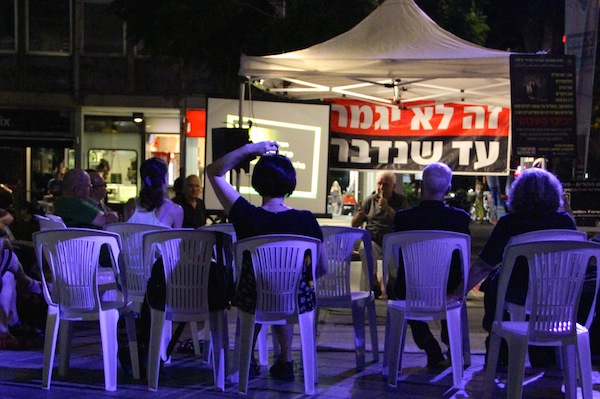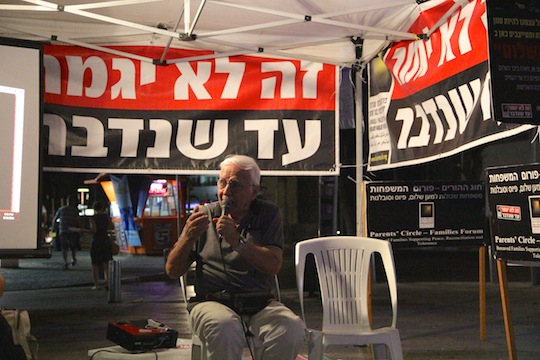The forum of bereaved families rests on the belief that the only way to end violence between Israelis and Palestinians is by recognizing the humanity of ‘the enemy’ through open and honest dialogue. That goal, however, appears to be as far away as ever.
By Henriette Chacar
It’s hard to imagine how one might begin solving the Israeli-Palestinian conflict by leading by example. The hundreds of members of the Parents Circle forum of bereaved Palestinian and Israeli families aren’t naïve, but they insist on trying.
The Parents Circle Families Forum, a grassroots organization of over 600 Israeli and Palestinian families bereaved as a result of Israeli-Palestinian hostilities, channel their loss to stimulate change. They pose an alternative to animosity and revenge by actively promoting reconciliation. So just before this summer’s Gaza war broke out, the Forum erected a “dialogue tent” outside one of the most prominent symbols of Tel Aviv’s culture – yet inside its bubble. Sitting outside the Cinemateque, rotating shifts of bereaved Israelis – and a few Palestinians – have been inviting the public to listen to their stories – and hoping to help them replace the need for vengeance with a process of dialogue and understanding.
Many of the Forum’s members joined the organization after a journey, at the end of which they realized that violence only begets more violence. For Yuval Rot, joining the Forum wasn’t an obvious or intuitive decision. Yuval’s brother, Udi, was on reserve duty a month after the Oslo Accord was signed in 1993. While hitchhiking back home to Kibbutz Hatserim, Udi was killed by three Hamas activists who disguised themselves as settlers.
To Yuval, participation in the Forum was contingent upon finding answers to a few burning, and personal questions: “Is it legitimate to use my personal grief as a tool? Do I want to expose my pain and share it with the public?” But believing in the ability of the Forum’s activities to save lives outweighed his hesitations. While his experience in the Forum hasn’t changed his political views, it amplified the sense of urgency and responsibility. There was no time to spare; in order for the cycle of violence to end, something had to be done.
Yuval found the Parents Circle Families Forum to be the best framework through which he could influence reality and do something effective and efficient on the ground. It was his interaction with the Palestinian members of the Forum that inspired him to create his own life-saving initiative, Road to Recovery, which today activates over 500 volunteers in Israel.
Next to a banner reading, “It won’t stop until we talk,” Doubi Schwartz, the Israeli co-executive director of the Forum, sits next to the tent in central Tel Aviv for the 69th consecutive day, adding that if the group can stop the community of bereaved families from expanding, it will have achieved its goal.
“We don’t want any more families, neither Israeli nor Palestinian, to lose their loved ones to the conflict,” he states.
The Forum rests on the belief that the only way to achieve that goal is by recognizing the humanity of “the enemy”, through open and honest dialogue. “If we, as bereaved families, manage to accept this, then there is absolutely no reason for the rest of society not to,” Doubi says.
That goal, however, appears to be as far away as ever. The past year has witnessed the failure of (yet another) round of peace talks, ongoing settlement building, and the deadliest military operation since the first Lebanon War. Even the Tel Aviv “bubble” was temporarily popped by rocket sirens and the normally safe space for protests disappeared; leftists, Palestinians and non-nationalists were met with fear, physical intimidation and violence.
Amid this mountain of palpable volatility, the Parents Circle saw an opportunity to interpose a different kind of discourse. Acknowledging that peace agreements are void of meaning without public support, the Forum highly regards trust-building projects on the civilian level. So they came up with the idea of putting a tent dedicated to public dialogue in one of Tel Aviv’s central squares.
Although idea for the tent was born even before the news of the three kidnapped boys that started this bloody summer, its significance was amplified with each compounding escalation, Schwartz says.
“We noticed that there wasn’t a single public space in Israel dedicated to talking about the consequences of the conflict,” he reflects, “and the war made it especially relevant.”
During the summer’s war in Gaza, the tent served as a meeting point for – at least a few – Israeli and Palestinian voices who contest the use of force as a solution to the conflict. Their insistence on reconciliation, however, did not leave them invulnerable to the effects of the war; Doubi recalls how the activists had to run for shelter whenever the sirens went off.
Their call for understanding proves to be too demanding for some people. “Traitors! You are all traitors!” shouts a couple walking by. The host of this evening’s program invites them into the tent to express their opinions but they don’t come. According to Doubi, these are precisely the people being targeted by the activities of the Forum. “The last thing we want is to preach to the choir,” Schwartz says. Peace cannot happen if trust isn’t built between the two peoples, he adds.
But not everybody is listening. Since the First Intifada, 2,811 Israelis and 8,890 Palestinians have been killed. Tens of thousands more have been injured or maimed. It is safe to say that most Israelis and Palestinians have in some way been directly touched by the decades of violence – and not all of those people joined the Forum. Some have formed extremely hawkish groups like Almagor, which only appears in public to challenge the government’s policy towards terrorism – mostly to oppose prisoner releases.
These families have made the ultimate sacrifice to their society, and so their actions are attributed a certain legitimacy that is unlikely to be granted otherwise. The same could be said about Palestinian society, although often in different ways – and with different sensitivities. The other half of the Forum’s operations, based out of the West Bank city of Beit Jala, faces different challenges.
“There are many peace projects and dialogue initiatives in Palestine, but at the end of the day,” Mazen Faraj, the Palestinian co-executive director of the Forum, says in a telephone interview, “the participants go back to the refugee camps and face soldiers, checkpoints, occupation and war once again.”
Living under occupation largely influences the approach taken by the Forum when addressing Palestinian audiences. The benefits of such dialogue sessions must be clear and tangible, Faraj explains. When it works with other Palestinian social movements and organizations, the Forum presents itself as a platform for non-violent resistance against the occupation.
If the tent project were to be launched in a Palestinian city it would have to induce hope for the future, he says, adding that Palestinians must feel the activity will somehow make their lives easier.
“People have lost a lot to the conflict, but they want their lives back. They’re hungry to live a normal life,” says Faraj. For him, working at the Forum is a way of achieving justice for the Palestinian people.
Addressing the group’s Palestinian critics, some in the anti-normalization movement which largely opposes symmetric dialogue groups, Faraj says he respects their right to oppose them but rejects the idea that speaking with bereaved Israeli families can somehow be conflated with acceding to the occupation or yielding to the Israeli narrative.
Speaking to the other and understanding their pain puts a focus on shared humanity, which allows for genuine dialogue, Faraj says. “There’s a difference between wishing for something and believing in it. When you wish for something – you sit at home and wait for it to happen, but when you believe in something – you choose to continue in that path each morning, until you find the solution. What we try to do is to make people believe, not wish.”
After 71 days, the Forum came to the conclusion that more audiences should participate in the discourse. Folding up the dialogue tent outside the Tel Aviv Cinemateque, they will now bring it to various cities and towns throughout Israel, a spokesperson told +972, until the conflict is over.
Henriette Chacar is an aspiring journalist, born and raised in Jaffa. She is fascinated by Palestinian identity on the local, regional and global levels. Aside from writing, she is active in various regional cooperation and community development initiatives. @HenrietteChacar



